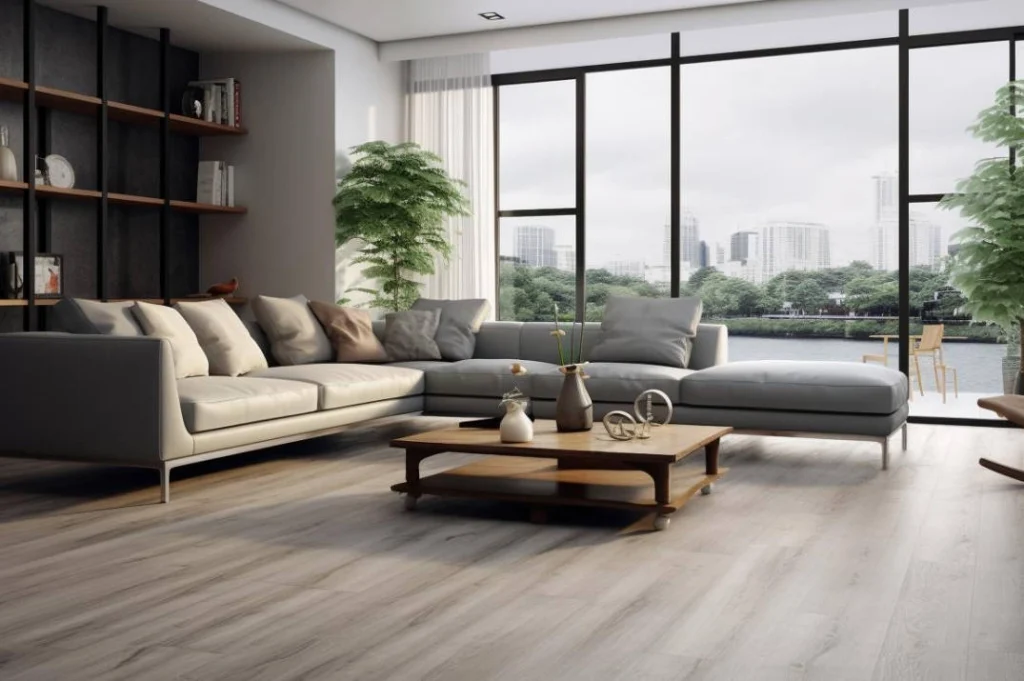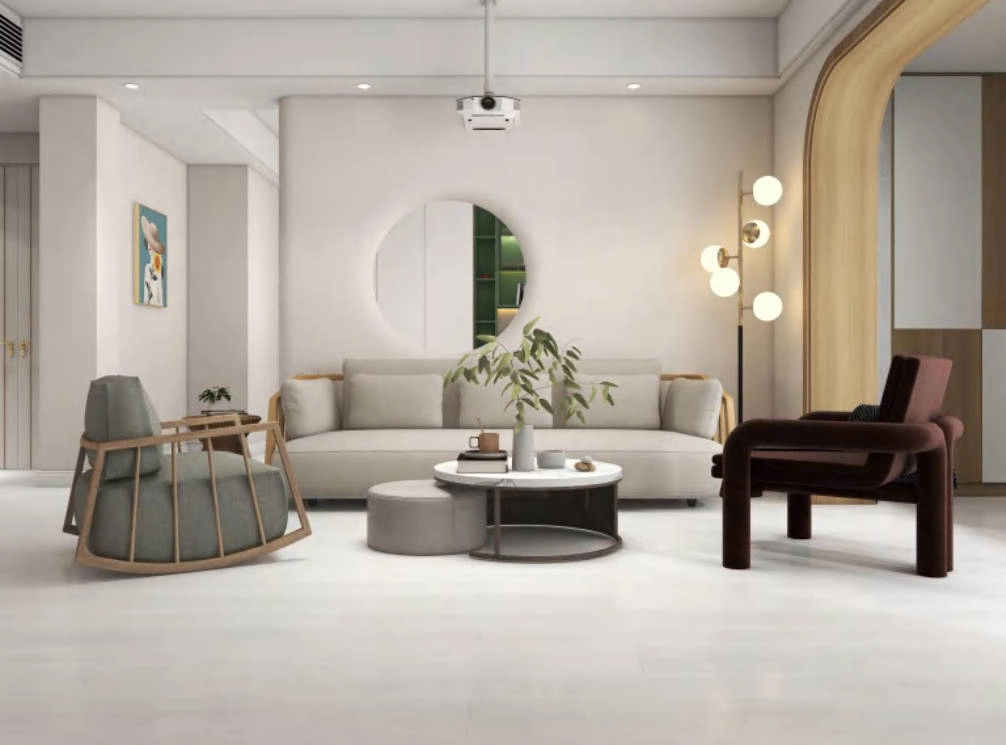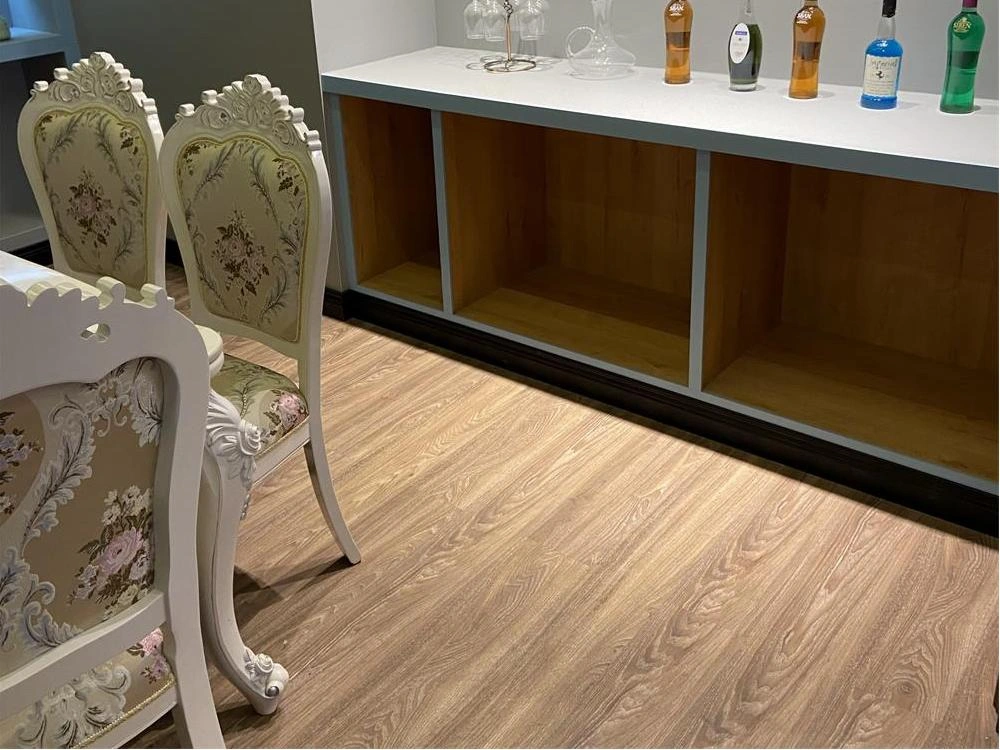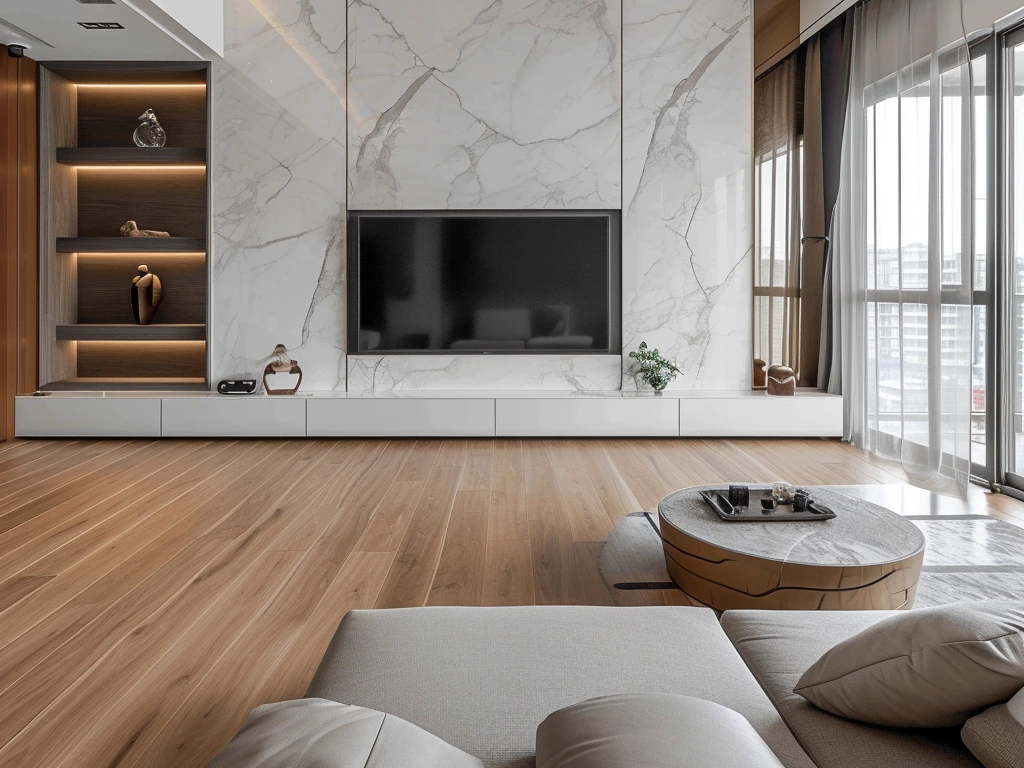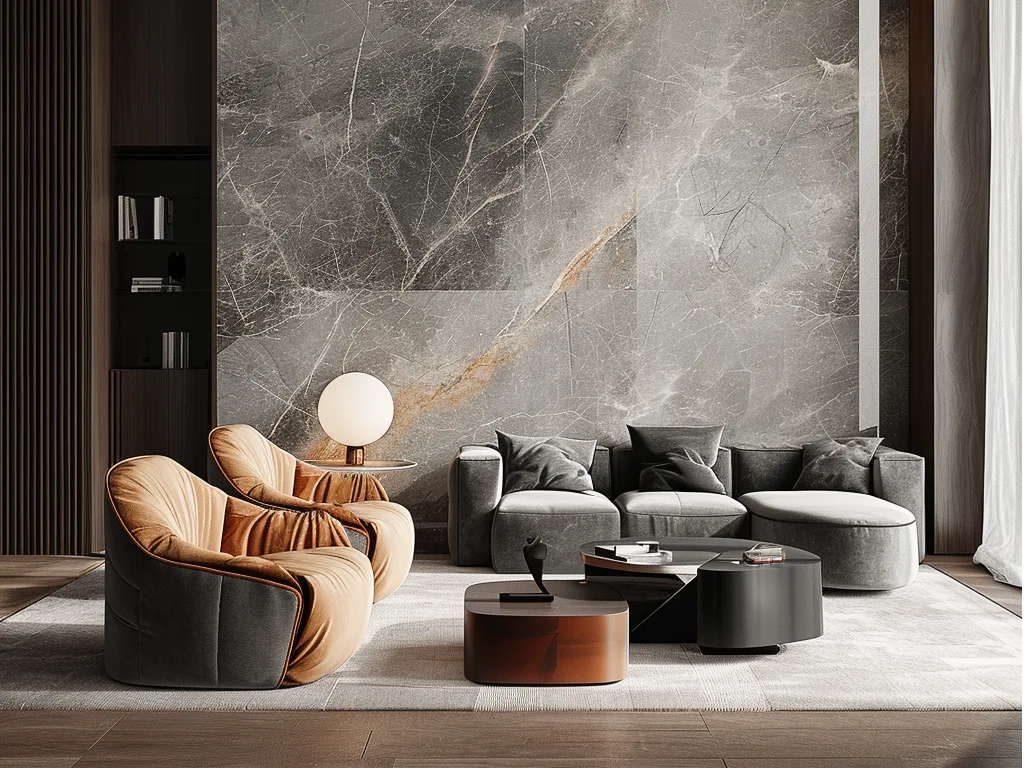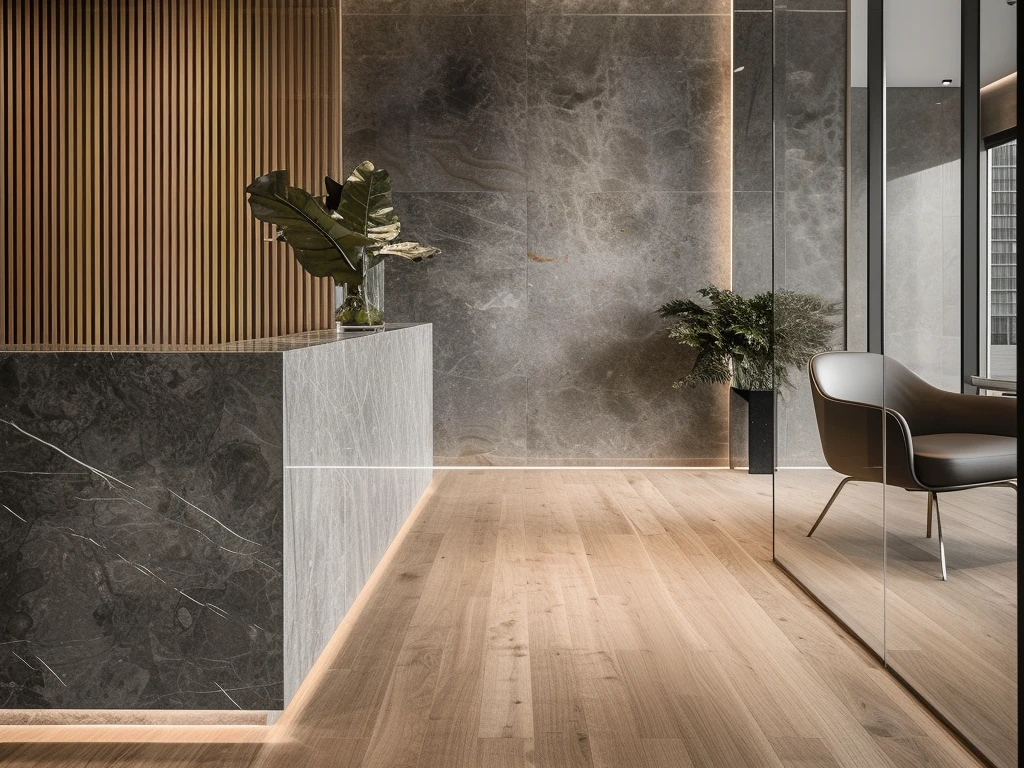What is SPC Flooring?
SPC (Stone Plastic Composite) flooring is a choice created using cutting-edge technology that comes with many advantages like zero formaldehyde content and resistance against moisture and fire as well as insects; it’s also easy to install! With a glue production process involving hot pressing and compliance with global standards such as EN14377 EN649 2011 IEC62321 GB4085 83 2011, these floors offer superb stability sustainability, and durability making them suitable for diverse uses, in homes hotels hospital,s and commercial establishments.
What is WPC Flooring?
WPC (Wood Plastic Composite) flooring is a type of composite material that combines natural wood powder and plant fibers (from cane) along with lightweight calcium carbonate (stone powder) and polymer resin as its main components. Additional ingredients such as flame retardants and foaming agents are mixed in the production process along, with polyethylene wax (PE wax). The manufacturing involves high temperature extrusion techniques combined with molding and lamination processes. One of the features of WPC flooring is its lightweight expanded polymer core that not only offers comfort underfoot but also boasts superior acoustical properties. It also provides an added layer of luxury vinyl, with texture giving your floors the appearance of authentic hardwood or slate materials.
Comparing SPC and WPC Flooring
Durability and Stability
SPC flooring is known for its density ranging from 1. 9 ~ 2. 3 G/cm³, making it incredibly durable. It exhibits shrinkage of ≤ 0.15% At a temperature of 80 ℃ over a period of six hours highlighting its dimensional stability under heat. With a warpage of ≤ 0.7 mm/m SPC flooring ensures that the floor stays level and smooth over time. On the other hand, WPC flooring offers a blend of wood’s finest qualities and high-density PE providing you with profiles that mimic the natural look of timber while offering enduring strength, in challenging weather conditions.
Comfort and Aesthetics
When you choose WPC flooring you’ll enjoy its expanded polymer core that offers comfortable support underfoot and a variety of colors that mimic natural wood textures for a personalized touch based on your preferences. Moreover, the distinctive woody scent that emerges when it burns is due to the increased use of powder, in its composition. In contrast,t SPC flooring boasts a layer that improves comfort by minimizing noise transmission.
Installation Process
SPC and WPC flooring both have installation methods although their approaches vary slightly.SPC flooring employs a click lock system eliminating the requirement for glue or nails which makes it convenient for installation on surfaces like level concrete or wood floors.It is essential that the installation takes place on a surface and ensures that the subfloor flatness meets specific standards, for optimal outcomes.
Vinyl plank flooring also uses a click-lock mechanism. Focuses on simplicity thanks to its light core that enables it to float over many surfaces and conceal minor floor imperfections effectively. The straightforward installation process saves time and money making it a popular option for DIY enthusiasts or quick home renovations, without sacrificing style or quality.
Choosing Between SPC and WPC Flooring
Factors to Consider When Choosing
Durability and stability. When deciding between SPC and WPC flooring, several factors should be taken into account to ensure the most suitable choice for your specific needs. Durability and stability are crucial considerations. SPC flooring is manufactured using a glue method with hot pressing techniques that adhere strictly to global standards such as EN14372 and EN649. 2011. These standards are IEC62321 and GB4085. 83. 2011 Emphasize its environmentally friendly qualities. The absence of formaldehyde and heavy metals makes it a safe and sustainable option, for use.
Eco-friendly. When it comes to WPC flooring as opposed to options out there in the market today – it’s got quite the reputation, for being eco-friendly and not causing any harm to the environment whatsoever which is pretty neat; plus it’s easily recyclable too! That’s why many folks who care about sustainability and being eco-conscious find WPC a choice when it comes to reducing their carbon footprint.
Style customization. When looking at flooring options like WPC and SPC flooring types it’s important to think about how they can match your style preferences with their variety of colors and textures available for customization. The WPC flooring gives a rustic feel with its wood-like texture and durability against tough weather conditions whereas SPC flooring offers a contemporary look, with its smooth matte finish and decorative film layer.
Installation. When deciding between these two flooring options. SPC and WPC. It’s important to consider how easy they are in terms of installation too. Both SPC and WPC come with installation methods using click-lock systems that remove the need for glue or nails. However, WPC’s light core makes it easier for it to sit atop surfaces smoothly effectively covering up minor flaws, in the subfloor.
Pros and Cons of SPC and WPC Flooring
SPC Flooring
Pros:
- Environmental Protection: SPC flooring is made from natural stone powder and resin without formaldehyde or heavy metals.
- Durability: With a density of 1.9~2.1g/cm³, SPC flooring offers excellent dimensional stability under heat.
- Scratch Resistance: The UV layer on SPC provides scratch resistance up to 2800 or more.
- Ease of Maintenance: Easy to clean due to its smooth surface finish.
Cons:
- Limited Aesthetic Options: While offering a modern look, SPC may lack the warmth of natural wood aesthetics found in WPC.
- Less Underfoot Comfort: The density that contributes to durability might compromise comfort compared to the softer feel of WPC.
WPC Flooring
Pros:
- Aesthetic Versatility: Offers a wide range of colors with natural wood texture options.
- Comfort: The expanded polymer core provides underfoot comfort with excellent acoustical qualities.
- Environmental Friendliness: Recyclable material that aligns with sustainable development policies.
- Moisture Resistance: Effective in humid environments where traditional wood products would fail.
Cons:
- Higher Cost: Due to its composite materials and aesthetic versatility, WPC can be more expensive than SPC.
- Potential for Slight Expansion/Contraction: Although minimal, there might be slight changes in size with temperature fluctuations.
Why Choose Latitude for Your Flooring Needs
Latitude is widely recognized as a leading choice for all your flooring needs because of its dedication to excellence and environmental responsibility. Their offerings adhere to safety guidelines, including EN14041 and EN16094 certifications guaranteeing exceptional performance in a range of settings such, as homes, hotels, and healthcare facilities.
Latitude goes above. Beyond simply delivering top-notch products by focusing on ensuring customer happiness through customized solutions that cater to each project’s unique requirements whether it involves meeting particular aesthetic objectives or guaranteeing peak performance in distinct environmental settings.

